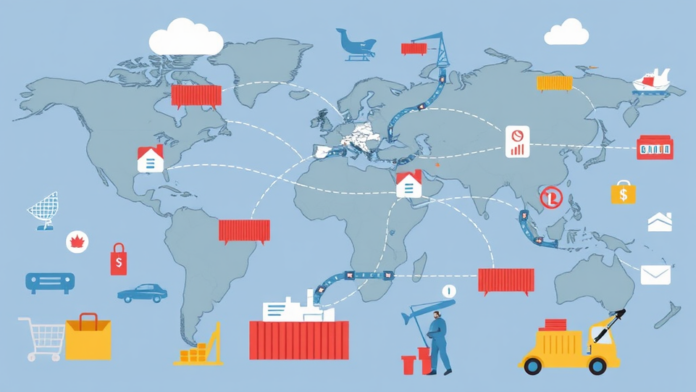Introduction to Global Supply Chain Disruptions
Definition and Overview
Global supply chain disruptions refer to significant interruptions in the flow of goods and services across international borders. These disruptions can stem from various factors, including geopolitical tensions, natural disasters, and pandemics. Such events can lead to increased costs and delays, impacting businesses’ operational efficiency. Understanding these dynamics is crucial for financial planning. Companies must adapt to maintain profitability. The stakes are high in today’s interconnected economy. Every decision counts.
Historical Context and Recent Trends
Historically, supply chain disruptions have been influenced past wars, economic crises, and technological changes. These events have shaped the way businesses operate globally. Recently, the COVID-19 pandemic highlighted vulnerabilities in supply chains. Many companies faced unprecedented challenges. This situation forced a reevaluation of risk management strategies. Adaptation is essential for survival. The landscape is constantly evolving.
Causes of Supply Chain Disruptions
Natural Disasters and Climate Change
Natural disasters and climate change significantly disrupt supply chains. Events such as hurricanes, floods, and wildfires can halt production and transportation. These interruptions lead to increased operational costs and inventory shortages. Companies must assess their exposure to these risks. Proactive measures are essential for resilience. The financial impact can be substantial. Every business should prioritize risk mitigation strategies.
Geopolitical Tensions and Trade Policies
Geopolitical tensions and trade policies can severely impact supply chains. Tariffs and sanctions disrupt the flow of goods. These barriers lead to increased costs and delays. Companies must navigate complex regulatory environments. Strategic planning is crucial for compliance. The stakes are high in global trade. Every decision can affect profitability.
Impact on Businesses
Operational Challenges
Operational challenges can significantly hinder business performance. Delays in supply chains lead to unmet customer demands. This situation results in lost revenue opportunities. Companies must adapt quickly to changing conditions. Flexibility is essential for success. Every moment counts in business. Quick decisions are vital.
Financial Implications
Financial decisions significantly influence business operations. Companies must assess their capital structure and cash flow management. Effective financial planning can enhance profitability. Poor financial choices can lead to insolvency. This is a critical concern. Investors often scrutinize financial health. They seek transparency and stability. A company’s financial strategy directly affects its market position. Understanding these dynamics is essential. Financial literacy is crucial for success.
Sector-Specific Effects
Manufacturing and Production
Different manufacturing sectors face unique challenges. These challenges can affect productivity and efficiency. Each sector requires tailored strategies for improvement. Adaptation is key to success. Companies must invest in technology anr training. This can enhance workforce capabilities . Market demand influences production levels significantly. Understanding consumer needs is vital. A proactive approach is essential for growth.
Retail and Consumer Goods
The retail sector significantly influences consumer behavior regarding skin care products. This influence shapes purchasing decisions and brand loyalty. Consumers often seek products that promise effective results. Quality ingredients are essential for skin health. Many brands now emphasize transparency in their formulations. This builds trust with informed consumers. Additionally, marketing strategies increasingly focus on personalized recommendations. Tailored advice can enhance customer satisfaction. Understanding skin types is crucial for effective care. Knowledge empowers consumers to make better choices.
Strategies for Mitigating Risks
Diversification of Suppliers
Diversifying suppliers is essential for risk management. This strategy reduces dependency on a single source. Companies can enhance supply chain resilience through diversification. A varied supplier base mitigates potential disruptions. He must evaluate suppliers based on reliability and performance. This ensures consistent quality and delivery. Additionally, geographic diversification can protect against regional risks. Understanding market dynamics is crucial. Knowledge is power in procurement decisions.
Investment in Technology and Automation
Investing in technology enhances operational efficiency. This investment can reduce long-term costs. Companies should assess potential returns on automation. A thorough analysis is essential. Implementing new systems requires careful planning. He must consider employee training needs. Additionally, ongoing maintenance is crucial for success. Understanding these factors minimizes risks. Knowledge leads to better decisions.
Budgeting for Supply Chain Resilience
Allocating Resources for Contingency Planning
Allocating resources for contingency planning is vital for maintaining supply chain resilience. This involves setting aside a specific budget for unexpected disruptions. Companies should evaluate potential risks to their supply chains. Identifying these risks is crucial. Additionally, investing in alternative suppliers can enhance flexibility. A diverse supplier base is beneficial. Regularly reviewing and adjusting budgets is necessary. This ensures preparedness for unforeseen events. Knowledge is key in effective planning.
Cost-Benefit Analysis of Supply Chain Investments
Conducting a cost-benefit analysis for supply chain investments is essential for informed decision-making. He must evaluate both direct and indirect costs. cay factors include initial investment, operational efficiency, and potential savings. A structured approach can clarify benefits.
Understanding these elements aids in budgeting. Knowledge drives better investment choices.
Future Outlook and Recommendations
Emerging Trends in Supply Chain Management
Emerging trends in supply chain management emphasize sustainability and technology integration. Companies are increasingly adopting eco-friendly practices. This shift enhances brand reputation and consumer trust. Additionally, automation is becoming essential for efficiency. He must consider data analytics for informed decisions. Real-time tracking improves transparency and responsiveness. Knowledge of these trends is crucial. Staying informed is vital for success.
Policy Recommendations for Businesses
Businesses should prioritize transparency in their operations. This builds trust with consumers and stakeholders. Implementing robust quality control measures is essential. Consistency in product quality is crucial. Additionally, investing in employee training enhances service delivery. Knowledgeable staff can provide better customer support. Companies must also adapt to changing regulations. Staying compliant is vital for sustainability.

